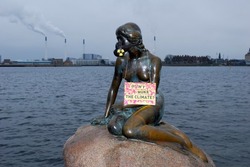Nuclear power protested from Copenhagen to Washington
 The nuclear power industry's efforts to promote new reactors as a solution to climate change is inspiring creative protests by environmentalists.
The nuclear power industry's efforts to promote new reactors as a solution to climate change is inspiring creative protests by environmentalists.At the U.N. Climate Summit in Copenhagen yesterday, members of environmental groups that are part of the international Don't Nuke the Climate campaign placed a radiation-protection mask on the city's iconic Little Mermaid statue.
The protests are leading up to tomorrow's international "Don't Nuke the Climate!" action day, with more than 200 actions planned in a dozen countries.
Here in the United States, the Nuclear Information and Resource Service (NIRS) -- a nuclear power watchdog group with offices in Asheville, N.C. -- has several actions planned for today and tomorrow. Also involved are Public Citizen, Beyond Nuclear, Friends of the Earth and the Chesapeake Safe Energy Coalition.
On Friday morning, activists with those groups will gather at the Department of Energy for Christmas-themed street theater to protest the already-proposed $18.5 billion in taxpayer loan guarantees for the construction of new nuclear reactors, including projects underway in South Carolina and Georgia. That will be followed at noon with a debate between Michael Mariotte of NIRS and Alex Flint of the Nuclear Energy Institute, an industry advocacy group. While the debate is being held primarily for the benefit of congressional staff, the public is invited to attend.
NIRS is also organizing congressional call-in days on Dec. 11 and 12. The callers will be asking their Senators to keep nuclear power subsidies out of the climate bill now being considered.
Yesterday the three Senators who are taking the lead in crafting the climate bill -- John Kerry (D-Mass.), Joe Lieberman (I-Conn.) and Lindsey Graham (R-S.C.) -- released a broad outline of the measure in a letter to President Obama [pdf]. Aiming to reduce greenhouse gas emissions "in the range" of 17% below 2005 levels by 2020, it calls for increased incentives for offshore oil and gas drilling and for so-called "clean coal" technology -- as well as for new nuclear reactor construction:
American has lost its nuclear technology manufacturing base, and we must rebuilt it in order to compete in the global marketplace. Our legislation will encourage the construction of new nuclear power plants and provide funding to train the next generation of nuclear workers. We will make it easier to finance the construction of new nuclear power plants and improve the efficiency of the licensing process for traditional as well as small modular reactors, while fully respecting safety and environmental concerns. In addition, we support the research and development of new, safe ways to minimize nuclear waste.Two moderate Senators -- Maria Cantwell (D-Wash.) and Susan Collins (R-Maine) -- plan to release a competing proposal today that would reportedly set a price on carbon emissions and return most of the revenue to consumers who will face higher fuel costs. The average household would receive a tax-free refund of about $1,100 a year, the New York Times reports.
The protesters say that new nuclear plants do not offer a real solution to climate change because it takes about 10 years to build a single reactor -- longer than we can wait to start making carbon reductions -- and because those reactors are enormously expensive, sucking up investments that could be spent on more efficient technologies.
In addition, the protesters point out that nuclear power does in fact produce greenhouse gases -- when reactors are constructed and in the mining, transport and reprocessing of fuel. At the same time, global warming puts nuclear plants at risk, with a growing number of reactors being shut down due to summer heat waves and droughts that impact their cooling systems.
To date, more than 850 organizations worldwide have signed a statement that says, "We do not support construction of new nuclear reactors as a means of addressing the climate crisis. Available renewable energy and energy efficiency technologies are faster, cheaper, safer and cleaner strategies for reducing greenhouse emissions than nuclear power." More than 50,000 people in 112 countries have signed a similar petition in the past two months.
(Photo from Don't Nuke the Climate campaign website.)
Tags
Sue Sturgis
Sue is the former editorial director of Facing South and the Institute for Southern Studies.
